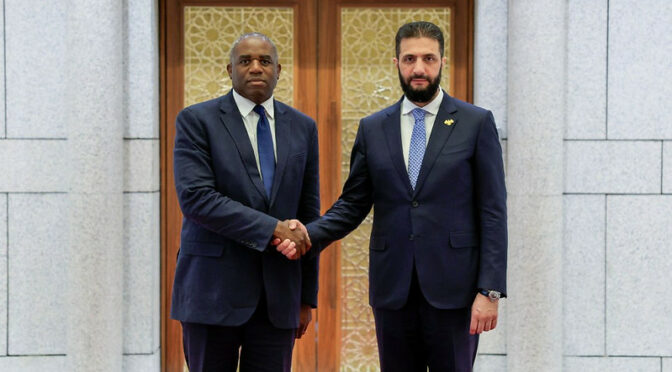Article published in The Daily Telegraph, 9 July 2025. © Richard Kemp
Last week David Lammy proclaimed himself the first UK Minister to visit Syria since Assad’s retreat to Moscow. Renewing British relations with Damascus, Lammy proudly posed for a photograph with a smiling president Ahmed Hussein al-Sharaa.
Lammy argues that a stable Syria is in the UK’s interests: it reduces the risk of illegal immigration, ensures the destruction of chemical weapons and tackles the threat of terrorism. Yet predictably he has not acknowledged that this possible move towards stability is solely down to a country he has vilified, scorned and accused of war crimes.
Assad hung on to his reins amidst years of violent uprising due to Iranian support backed up by Russia. Al-Sharaa was only able to seize power because Israel had smashed up Hezbollah, which otherwise would have stopped him in his tracks. Nor could the Islamic Revolutionary Guard Corps ride to Assad’s rescue because the IDF would not have permitted it to do so.
Israel went further, dismantling Syria’s military hardware, Iranian bases and chemical weapons factories in relentless pre-emptive strikes following Assad’s downfall. Again, Lammy should be thankful for that, because however the situation develops in the future, neither al-Sharaa nor any other Syrian warlord will have the means to deliver extreme violence without rebuilding these capabilities.
Indeed, that calculation was probably decisive in the Foreign Office’s decision to send Lammy to deliver overtures to al-Sharaa, making the whole enterprise far less risky.
But immense risks nevertheless remain. As well as the Syria-focused Al-Nusra Front and Hay’at Tahrir al-Sham, Al-Sharaa’s jihadist credentials include Al Qaeda and the Islamic State by proxy, both of whom have of course targeted and attacked UK interests at home and abroad. The same is true of many of his long-standing henchmen now in the interim government. As well as fighting to establish an Islamic emirate in Syria, Al-Sharaa spent three years with Al Qaeda in Iraq and was believed to have been deputy to the notorious terrorist butcher Abu Musab al-Zarqawi whose international jihadist ambitions were unbridled.
Now al-Sharaa is representing himself as a moderate, flirting with leaders from around the world including the US, Europe, Russia, China and the Gulf states, seeking their acceptance and above all, sanctions relief and financial support. His talk of ‘inclusivity’ and protection of minorities echoes the words of the Taliban before and immediately after the US withdrawal from Afghanistan. Some actually believed them, but look at what’s happening now.
So is al-Sharaa a pragmatist interested in peace and development in Syria and, as he puts it, a country no longer ‘a battleground for power struggles or a stage for foreign ambitions’? Or is he an unreformed murderous jihadist who is also a talented actor? Certainly he seems to say whatever any national leader he is talking to wants to hear, although that is not necessarily an unusual trait in politicians and diplomats, especially those in need of legitimacy and recognition.
His repeated breaks and feuds with jihadist groups he had once fought alongside suggests that while it is unlikely he will shed his Islamist doctrines, he is more interested in personal power than ideology. That could go either way for both Syria and the world, but one sign of concrete good faith in both respects would be the expulsion of foreign fighters that continue to rampage the country.
On balance Lammy was right to re-open diplomatic relations with the new regime in Damascus, despite the risks. Western influence is important in this strategically critical country, especially to counter the undoubted ambitions of ill-disposed regimes like Russia, China, Iran, Qatar and Turkey. But what should not be on the agenda is to unduly interfere in Syria’s internal affairs, such as demanding Western-style democracy, an unrealistic proposition for most countries in the Middle East.
Nor should we be pushing for a centralised unitary state which is not the natural condition for a country with multiple powerful ethnic and religious components. But, meanwhile, we should do all we can to ensure that the country most at risk from a potentially hostile Syria, Israel, has complete freedom of action to defend its people, no matter how that might stick in Lammy’s craw.
The watchword should be ‘distrust, but verify’. And the Foreign Office, not known for its humility, should if necessary be prepared to admit it was wrong and change tack. Before he becomes too enchanted with the new Syrian leader, Lammy should look back into the Foreign Office archives where he will find a telegram dated 20th December 1969 from Glencairn Balfour-Paul, the British ambassador in Baghdad. Balfour-Paul had just had a meeting with the then vice-chairman of the Revolutionary Command Council, one Saddam Hussein.
Like al-Sharaa, he had an ‘engaging smile’ and the ambassador described him as a figure with whom ‘it would be possible to do business’. Decades later, Balfour-Paul admitted that Saddam ‘hadn’t presented his true colours’.
Image: FCDO/Flickr

